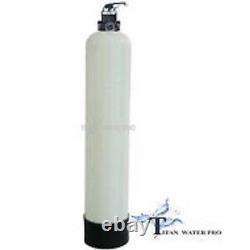Whole House Fluoride Blended Bone Char Carbon Whole House Filter 0.75 CU FT


Whole House Fluoride/Arsenic BC Carbon Whole House Filter 0.75 CF GAC Coconut Shell/Bone Char - Manual Valve Backwash. Unlike standard coconut or charcoal based carbon filters which cannot filter fluoride, our Whole House Filter uses a unique calcium based Bone Char carbon designed to reduce the fluoride from your water.
Removes/Reduces Fluoride, and chemicals and odors. Additional Metals Addressed By Bone Char Carbon.
The information provided on this table is based on Additional testing results of removal efficiency for heavy metals with the use of Bone Char courtesy of Glasgow University, UK and manufacturers of Bone Char. Additional contaminants that bone char carbon is recommended for are not certified by WQA or state standards. Contaminates addressed by bonechar may not be in your water.
The use of bone charcoal or bone char is reported to be an effective means for the reduction of fluoride. Bone charcoal contains a carbon structure while supporting a porous hydroxyapatite matrix (a calcium phosphate hydroxide in crystalline form which is rich in surface ions which can be readily replaced by fluoride ion). The carbon media also works like regular carbon does. A whole-house filter system treats all water traveling to any faucet or fixture in the home.It removes the chemical before it can be ingested, breathed in, or absorbed by the skin during washing or bathing. A larger carbon filter like this one provides better filtration because of the amount of carbon, and depth of the filter bed. It does not cause a water pressure drop in your home compared to solid block carbon filter installed at the point of entry. Carbon removes/reduces many volatile organic chemicals (VOC), pesticides and herbicides, as well as chlorine, benzene, trihalomethane (THM) compounds, radon, solvents and hundreds of other man-made chemicals found in tap water.
Carbon is a substance that has a long history of being used to absorb impurities and is perhaps the most powerful absorbent known to man. One pound of carbon contains a surface area of roughly 125 acres and can absorb literally thousands of different chemicals. Activated carbon which has a slight electro-positive charge added to it, making it even more attractive to chemicals and impurities. As the water passes over the positively charged carbon surface, the negative ions of the of the contaminants are drawn to the surface of the carbon granules. Activated carbon filters used for home water treatment typically contain either granular activated carbon or powdered block carbon. Although both are effective, carbon block filters generally have a higher contaminant removal ratio. The two most important factors affecting the efficiency of activated carbon filtration are the amount of carbon in the unit and the amount of time the contaminant spends in contact with it. The more carbon the better. Similarly, the lower the flow rate of the water, the more time contaminants will be in contact with the carbon, and the more absorption that will take place. Particle size also affects removal rates.The most common carbon types used in water filtration are bituminous, wood, and coconut shell carbons. While coconut shell carbon typically costs 20% more than the others, it is generally regarded as the most effective of the three. All of our activated carbon filters use coconut shell carbon.
There are two principal mechanisms by which activated carbon removes contaminants from water; absorption, and catalytic reduction, a process involving the attraction of negatively-charged contaminants ions to the positively-charged activated carbon. Organic compounds are removed by absorption and residual disinfectants such as chlorine and chloramines are removed by catalytic reduction.
Activated carbon filtration is very common in a number of home water treatment systems. It can be used as a stand alone filter to reduce or eliminate bad tastes and odors, chlorine, and many organic contaminants in municipal (pre-treated or chlorinated) water supplies to produce a significantly improved drinking water. Activated carbon filters remove/reduce many volatile organic chemicals (VOC), pesticides and herbicides, as well as chlorine, benzene, trihalomethane (THM) compounds, radon, solvents and hundreds of other man-made chemicals found in tap water. This system is easy to set up.
With this system you will receive. 1 - 8x44 FRP vessel. 1 - Manual Backwash Valve. 1 - 0.75 (3/4) cubic ft Bone Char & GAC Coconut Shell Carbon Blend. It has very few moving parts, and easy to use.When you need to backwash a filter, you put it into the backwash cycle for 10 minutes, followed by a rinse for 3 minutes, and then back into the service mode. That is all there is to it!
Once a week schedule for backwashing is generally sufficient. For a more economical product, and ease of use, we recommend you get this rather than opting for a unit that does not backwash, read the section on the benefits of backwashing above. Please visit our store for more choices on quality water filters and reverse osmosis systems. Terms of Sale: Used or installed items are not accepted for return. Titan Water Pro is your "Clean Water Solutions".

